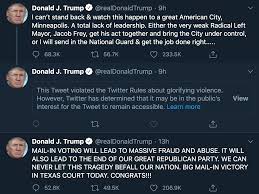President Trump’s Executive Order for a review of Section 230 laws, which provide a level of legal exemption for digital platforms with respect to liability for what users post to them, has now moved to the next stage, with the FCC to decide on the fate of the proposal, and the case for any such revision.
Trump issued his EO after Twitter added warning labels to two of his tweets relating to election participation back in May. Trump had already flagged a potential review of conservative bias on social platforms, and Twitter’s warning labels pushed him to take action.
That resulted in the issuing of his executive order, which officially calls for:
- Increased transparency and accountability from online platforms in regards to platform policies
- A review of protections which provide social platforms a level legal immunity when selectively censoring speech
As per CNN:
“The [proposal is now] in the FCC’s court. The agency must now decide whether to agree to President Donald Trump’s call for FCC oversight of internet platforms. Trump and other Republicans have long criticized companies, including Facebook and Twitter, for allegedly censoring conservatives; the companies have denied the claims.”
If the FCC does decide to action the request, it could implement new restrictions on how social platforms operate, which would limit their capacity to take action on content, depending on the nuances of the updated regulations. But it could also provide the opposite outcome to what the Trump administration expects. Trump, seemingly, is looking to force social platforms to allow more free speech, but added legal liability would more likely see the platforms further limiting such in order to protect themselves from subsequent action.
Most legal experts don’t expect the proposal to be adopted by the FCC, which has traditionally avoided regulating internet companies. The FCC does implement standards are regulations for traditional media broadcasts (radio, TV, etc.), but the open nature of digital platforms adds another level of complexity, which means assigning legal responsibility, in any practical respect, is a difficult task
Essentially, applying traditional media regulations on contributor-driven networks is virtually unworkable, which means that the FCC would need to implement a whole new regulatory framework. This is possible – and definitely, plenty of nations are already calling on social networks to take more action to address hate speech and other content violations. But it would be a significant shift, which would likely require powers beyond the scope of this order.
But, it is going ahead, and it may lead to a broader debate around the obligations of social networks, and the protections for such, moving forward.
That, most likely, won’t end up producing the result that the Trump administration is seeking, but it could spark a new, helpful debate around how we limit the spread of harmful content online.

This content is incredibly informative.
This content stands out from the rest.
This content is incredibly informative.
Bookmarking this for later.
Your writing style is engaging.
You really know your stuff.
I can’t wait to share this with others.
Thanks for simplifying a difficult subject.
This deserves more attention.